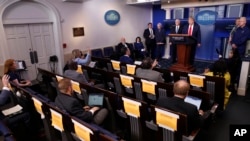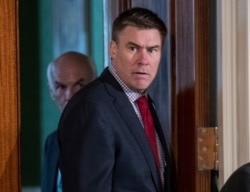President Donald Trump's attacks on the press have been effective at eroding the credibility of the press and undercutting consensus even as the COVID-19 pandemic continues to kill hundreds of Americans each day, a newly released study by the Committee to Protect Journalists (CPJ) said.
The New York-based press freedom group documented increased prosecutions of news sources, libel suits and harassment of journalists in the field and at U.S. border crossings, and cited more than 40 journalists, media law experts, academics and administration officials.
"Some expert observers fear an existential threat to American freedom of the press," says the study, which examines how the attacks "have empowered autocratic foreign leaders to discredit and restrict the press in their own countries."
"You can see the pattern, you can see how many authoritarian leaders around the world are going beyond what Trump has done, imposing restrictions on the press, arresting reporters, et cetera," Leonard Downie Jr., the study's author and a former executive editor of The Washington Post, told VOA.
"In many cases, they have actually used the same language as Trump," he said. "They talk about 'fake news.’ ”
"What worries me about these other countries using the United States as an example for what they're doing is that we have a First Amendment and they do not," added Downie, who is Weil Family Professor of Journalism at Arizona State University's Walter Cronkite School of Journalism and Mass Communication.
The study, which includes research by Stephanie Sugars of the U.S. Press Freedom Tracker — a coalition of news organizations that documents attacks upon and harassment of media — details the administration’s restrictions on access to government information; White House legal challenges to the press and Trump's calls for changes in libel law; and the president’s alleged "attempted interference in the financial independence of some media owners."
The White House did not respond to VOA’s request for comment.
Death threats and pipe bombs
The report cited cases of journalists being threatened in the past three years: The Boston Globe and CNN received death threats, and in 2018 pipe bombs were sent to CNN’s New York offices as well as senior Democrats and other officials.
Former White House communications director Michael Dubke is cited in the report, saying the president lashes out at the press because the coverage is too often negative.
“There have been no stories on the progress he made with the economy and foreign policy,” Dubke is quoted as saying, adding that the critical coverage surprised the president, who had long "had a good relationship with the press as a New York developer."
"He has always been available to the press,” said Dubke, who later in the report expressed concern about authoritarian leaders who use "Trump's words to justify what they are doing" to journalists in their own countries.
Downie, who also authored CPJ's 2013 report on former President Barack Obama's relationship with the press, draws comparisons with prior administrations.
Prosecutions
Trump's indictment of eight government employees over the past three years for leaking information to the press is on pace to exceed the number of Obama-era leaker prosecutions (10 government employees and contractors in eight years).
"The large number of prosecutions of news sources by Trump’s Justice Department 'is the fault of the Obama administration,' " says Washington Post columnist Margaret Sullivan in the CPJ study. “It created a blueprint that has been easy [for the Trump administration] to follow."
Michael Conway, counsel to the U.S. House Judiciary Committee in the Nixon impeachment inquiry, is quoted as calling Trump’s attacks "arguably more pernicious and damaging to the free press" than President Richard Nixon’s.
Downie, who helped edit the Post’s Watergate probe, said Trump's attacks are worse.
"For many months, most of the Nixon attacks in the media were focused only on The Washington Post," he told VOA. "It was uncomfortable for us at the time, but did not have the same effect in terms of affecting public opinion about all news media."
The Post was not circulated nationally at the time, Downie said, so it was more difficult for people to judge between what Nixon said and what the Post reported.
Because of that, he told VOA, "I did not [then] see that there was the same kind of widespread distrust of the news media generally.
"There were Nixon supporters, obviously, that were upset with the news media, but not as much doubting the credibility of the news media as there is now," Downie said. "And the worst things that the president said about the news media, of course, were not said publicly. They were said, we now know from the White House tapes, within the confines of the Oval Office."





